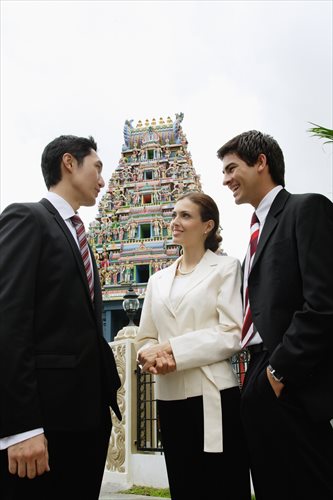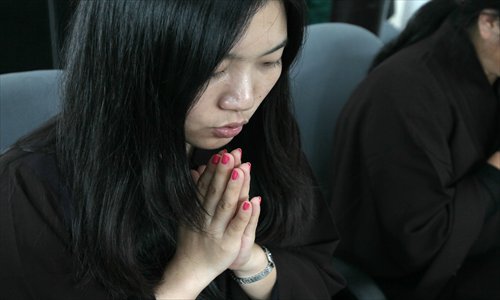HOME >> METRO BEIJING
Religious networking
By Li Lin Source:Global Times Published: 2014-11-20 21:00:42
Faith seen as a shortcut to connections and success

With the increasing number of influential religious people in China, some people are finding it expedient to pretend to be religious in order to make connections. Photo: IC
Suffering from cold and hunger, Ma Wenhui, a marketing manager working in a small mechanical and electrical instrumentation company in Qingdao, Shandong Province, trembled in darkness on a February night in 2014. He spent the night lying on a thin, shabby bed in a temporary guest house at Ci'en Temple, Taizhou, Zhejiang Province.There was no central heating or air conditioner, and he was rather cold at night on the mountain. Ma, a tall, strong man of over 80 kilograms, was used to eating meat in every meal.
"Without a heated house to live in and meat to eat, I felt close to death," recalled Ma, who sacrificed his Spring Festival holidays that year to suffer in the temple, but received a reward from his boss.
He was not a Buddhist, but chose to stay in the temple during the Spring Festival holidays just to accompany one of his most important customers, a Taizhou native surnamed Wang who runs a large private business.
"The principles of Buddhism tell people not to be materialistic, and that a simple life can lead to eternal happiness," said Ma. "And it was free for us to live on the mountain so the living conditions were quite difficult."
Ma had to get up early at 3:30 am, and participate in morning classes and meditation. Wang had been a devout Buddhist since 2009 and the difficult life was quite easy and enjoyable for him, but it was not the same with Ma.
"However, I had to do this because my boss asked me to keep Wang close, as he tended to turn to other companies for purchases," said Ma. "If I lost this big customer, I might have lost my job."
For other customers, Ma usually maintained the relationship by giving kickback money, taking them to entertainment facilities, and eating at luxury restaurants. But for a person with devout beliefs who refused everything "related with dirty lust," Ma had no other options.
"My boss told us marketing staff to identify every customer's hobby and make them happy, so I offered to go with him on the Spring Festival trip to the mountain," said Ma. "Religion was his only interest."

Many successful Chinese people turned to religion after building their careers. Photo: CFP
God and cashAccording to a 2010 report from US-based National Public Radio, 2006 research found that fortune and religious belief were becoming more closely tied together in China, with more successful businessmen becoming religious.
According to the Chinese Luxury Consumer White Paper 2011, jointly released by the Hurun Report and the Industrial Bank, about half of China's high net worth individuals admitted to having some kind of religious beliefs. The paper was based on surveys of 878 individuals with assets over 6 million yuan ($952,200), living in 29 cities across China.
These include Pan Shiyi, board chairman of the Beijing-based real estate developer SOHO China, who wrote in his blog in 2010 that he had converted to Bahaism, a religion which has recently been thriving in China.
Ouyang Sutong, a professor at the department of philosophy at the Huazhong University of Science and Technology told the Southern Weekly in 2010 that elites had started becoming more religious, hoping to be blessed by god.
Shortcut to promotion
"I can not say whether I am religious," said Miao Xinxing, who works as private driver for a Beijing-based Sino-foreign joint consulting company, but goes to church almost every week. "My boss is an American Chinese and his whole family are devoted Christians," said the young man in his 20s. "When I had just started my job in early 2014, the communication between me, my boss and his family was not smooth, and I was always waiting outside the church when they were in there worshiping, but one day in March I curiously followed them into the church and listened to the priest, and their attitude towards me became friendly."
Miao then realized it was a great way to get closer to his boss and maybe get promoted. As a result he bought a necklace decorated with a cross and began to read the Bible.
"Now I am familiar with the Bible stories and can often discuss it with my boss when driving," said Miao. "I found he trusts me more, and more importantly, he raised my salary."
Miao said he found that religion is not as dull as he had thought. He has also made friends in the church. "It's hard to say whether I am interested in Christianity. But I do not feel any shame making use of the religion to gain favor from my boss, because it was just an accidental discovery brought by my curiosity toward religion."
Certain groups have arisen to match job-seekers with employers with the same beliefs. Zhang Ming (pseudonym) joined an online QQ group full of Christians who were seeking jobs or recruiting employees, where they often discussed problems they encountered in their careers. Zhang joined the group in 2014 when he started his construction business in Beijing, and the Christian boss successfully recruited two out of the total 14 employees in his company via the QQ group.
"Professional knowledge is important in recruiting engineers for my business, but for workers such as secretaries and receptionists, who may be with me every day, I prefer people with more common interests with me, and of course religious belief is one important point."

Churches are one place where people can build bonds with Christians. Photo: CFP
Disguising beliefHowever, in many cases, religious belief is not an asset. Fang Hua (pseudonym), who works as a senior executive at a large State-owned bank, still does not dare tell colleagues that he is a Buddhist, let alone take subordinates to temples with him.
"I became a communist when I graduated from university, because in China being a communist is helpful to find a job in State-owned enterprises and the government," said Fang. "But I have been a Buddhist for a long time. Since communists are not supposed to have religious belief, I have always been hiding it, that's why I attend online QQ groups and WeChat groups with a pseudonym, and go to temples by myself."
Zhang Tingting, a devoted Buddhist expressed her opinion on religious networking to Metropolitan, and called people who use religion to make connections "fake followers."
"I do not think it is necessary for people to polish themselves off to be a real Buddhist," said Zhang Tingting. "I myself look down upon those hypocritical people who pretend to be religious, and if anyone uses Buddhism as an excuse to approach me, I will see through it and never talk to him or her."
Despite this attitude, Huang Jianbo, a professor specializing in religious studies at the Research Institute of Anthropology in East China Normal University told Metropolitan that people's motives for becoming religious should not be judged.
"It is a more universal phenomenon to 'pretend to be religious,' and there are two reasons for that," said Huang. "First, it is out of utilitarian purposes such as promotion or interpersonal relationship improvement with important people; second, some of them are curious and led by successful people, trying to follow their example by finding out whether religion is helpful," said Huang.
But it is worth noticing that most of the successful or rich people only turned to religion after they had already built their career, said Huang.
"Different religions may have different views on using religion as a method for networking. After all, I think this actually reveals aspects of religion's development in modern China, which means that with the progress of society, people begin to think about their existence rather than their lives."
Posted in: Metro Beijing